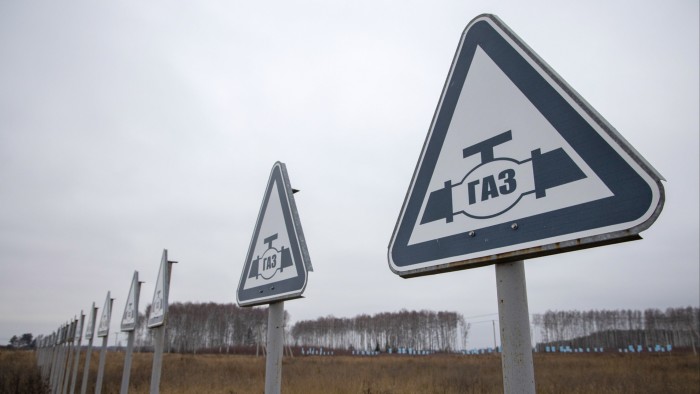Stay informed with free updates
Simply sign up to the EU energy myFT Digest — delivered directly to your inbox.
The European Commission will propose that the EU bans all new Russian gas contracts based on trade law in a move that seeks to circumvent any potential veto from Hungary and Slovakia.
Companies would be banned from signing any new contracts for Russian gas, effective immediately, according to a summary of the proposal seen by the Financial Times and due for presentation on Tuesday. Existing short-term contracts, pipeline gas and liquefied natural gas imports from Russia would have to be terminated from 2026, while those linked to long-term contracts would come to an end on January 1 2028, the summary said.
In a concession to Hungary and Slovakia, which import Russian gas, landlocked countries would be granted an exemption until 2027 to phase out their existing gas contracts, three officials with knowledge of the proposal said.
The proposals, which are under discussion and could change, follow the publication of a plan by the commission last month outlining how it aimed to cut off imports of Russian oil and gas into the EU by 2027.
They are separate from a proposal earlier this month to ban the use of the Nord Stream gas pipelines that run between Germany and Russia, as part of the bloc’s next round of sanctions in response to Moscow’s full-scale invasion of Ukraine.
Russian gas made up 14 per cent of the EU’s overall imports of the fossil fuel in 2024, according to the think-tank Ember, down from about two-fifths when Moscow started its invasion of Ukraine in 2022. That marks an 18 per cent increase, however, compared with 2023, mainly due to more shipments of Russian LNG.
Questions had been raised as to how the commission would enforce the measures, given that Hungary and Slovakia said they would veto efforts to add Russian gas imports to the bloc’s sanctions, which require unanimous approval of all member states.
Instead, the commission would use trade law, the summary said, allowing the proposals to pass with approval from a majority of member states. It would also cite articles in the EU’s founding treaty that EU energy policy must ensure the security of supply.
Dan Jørgensen, the EU’s energy commissioner, said on Monday that the commission wanted “to do this in a way so that no member state will have any problems with the security of supply, and we want to keep the prices as low as possible”.
An EU diplomat said that importing countries remained concerned about the legal risks and the possibility that companies would be forced to pay compensation to Russia to break the contracts.
Companies would have to provide detailed information to customs authorities on gas contracts to show that imports were not coming from Russia.
Slovakia’s deputy economy minister Vladimír Šimoňák said his government was “not really happy” with the EU plan, including the concession for his country to phase out contracts by 2027.
“Our contract with Gazprom runs for a longer period and there is little clarity on who would be responsible for the penalty fees,” he told the FT. He added that there was “even less clarity about how we would get the gas necessary for our economy” from 2028 on.
Despite being led by Moscow-friendly Prime Minister Robert Fico, the Slovak government has so far supported the EU’s sanctions regime against Russia. Fico, however, recently signalled he would oppose any further restrictions, particularly in the energy sector. “This is not a matter of an attitude to Russia, but of our vital interests,” Šimoňák said.
Under separate EU proposals, member states would also have to present plans showing how they would diversify their gas supplies if they were still receiving Russian gas. The biggest importer of Russian gas in 2024 was Italy, according to the think-tank Ember, followed by Hungary, France and Spain.
Countries with big ports such as France and Spain argue that much of the gas they import is sent on to other member states. French industry minister Marc Ferracci said on Monday that Paris supported the push to diversify supplies. Madrid has suggested that the EU should cover any compensation that has to be paid to Russia as part of lost litigation.
Hungary, however, remains deeply opposed. Foreign minister Péter Szijjártó told other energy ministers on Monday that he had requested that the commission withdraw the proposal, citing the additional impact of the Israel-Iran conflict on energy markets, according to two diplomats briefed on the discussion.



